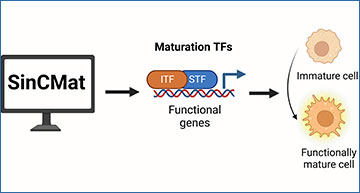A major goal of regenerative medicine is to generate tissue-specific mature and functional cells. However, current cell engineering protocols are still unable to systematically produce fully mature functional cells. While existing computational approaches aim at predicting transcription factors (TFs) for cell differentiation/reprogramming, no method currently exists that specifically considers functional cell maturation processes.
To address this challenge, researchers at the University of Luxembourg have developed SinCMat, a single-cell RNA sequencing (RNA-seq)-based computational method for predicting cell maturation TFs. Based on a model of cell maturation, SinCMat identifies pairs of identity TFs and signal-dependent TFs that co-target genes driving functional maturation. A large-scale application of SinCMat to the Mouse Cell Atlas and Tabula Sapiens accurately recapitulates known maturation TFs and predicts novel candidates. The researchers expect SinCMat to be an important resource, complementary to preexisting computational methods, for studies aiming at producing functionally mature cells.
Schematic outline of SinCMat
(A) Model of functional cell maturation used to design SinCMat. (B) The workflow of SinCMat. From scRNA-seq data of target cell, SinCMat identifies TFs required for functional maturation. (C) 4 major stages of SinCMat algorithm. (D and E) Histogram of genes extracted from functional GO categories binned by normalized expression ranks calculated in (D) the MCA and (E) the TS. (F) Enrichment analysis of functional GO genes for the 10%, 20%, 30%, 40%, and 50% most highly expressed genes in 18 MCA cell types and 16 TS cell types. Odds ratio (OR) is reported for each bin in each cell type. Categories with the highest OR were counted (frequency indicated by the y axis).
Availability – SinCMat is freely available for academic, non-profit use at https://sincmat.lcsb.uni.lu/
Barvaux S, Okawa S, Del Sol A. (2023) SinCMat: A single-cell-based method for predicting functional maturation transcription factors. Stem Cell Reports [Epub aead of print]. [article]





